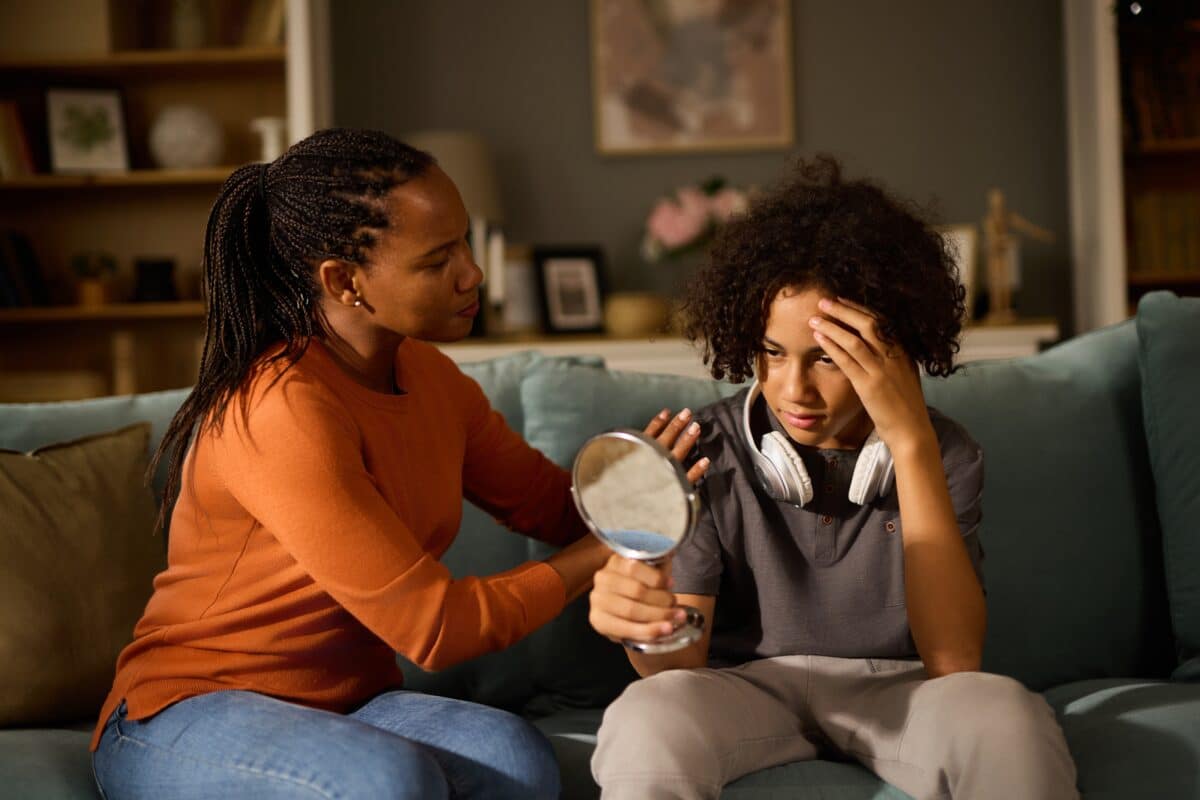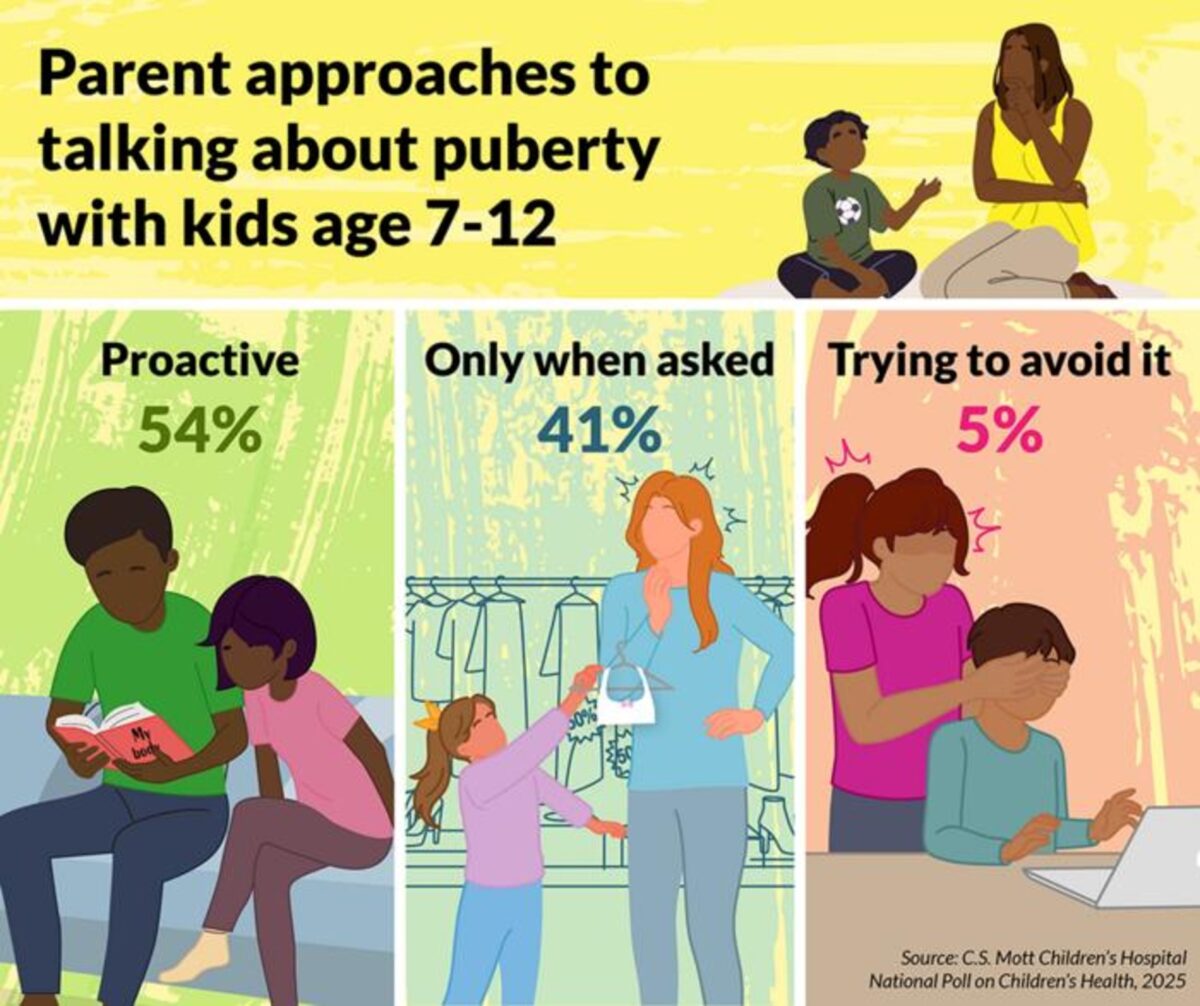
Is there a right time to talk about puberty? (StockPhotoDirectors/Shutterstock)
In a nutshell
- Puberty is starting earlier than many parents realize: 17% of kids ages 7–9 are already showing signs, yet most haven’t had any discussions about it with their parents.
- Nearly half of parents feel unprepared: 44% haven’t received any information on how to talk about puberty, and only 54% feel very confident recognizing the signs.
- Timing matters, but parents are split: One-third think puberty talks should happen before age 10, another third say age 10, and the rest think later, highlighting widespread uncertainty about when to begin these important conversations.
ANN ARBOR, Mich. — The awkward “birds and bees” talk might be happening too late for many American kids. A shocking new poll finds that while puberty is starting earlier than ever, with 17% of 7-9-year-olds already showing signs, nearly half of parents lack confidence in recognizing these changes, leaving children to navigate a confusing biological transformation without guidance.
According to the University of Michigan Health C.S. Mott Children’s Hospital National Poll on Children’s Health, early discussions about puberty help parents present information appropriately for their child’s age and prepare them for upcoming body changes, preventing unnecessary confusion or anxiety.
Nearly Half of Parents Lack Resources
The nationally representative poll reveals that 44% of parents have received no information on how to talk with their children about puberty, leaving many to navigate these sensitive conversations blindly. Despite this lack of preparation, more than half of parents (54%) describe their approach as “proactive,” while 41% only discuss puberty when their child brings it up, and a small but notable 5% try to avoid the topic altogether.
Many parents are passing down a cycle of silence. Nearly 40% report their own parents did not teach them about puberty at all, while only 31% feel they received adequate puberty education from their parents. This history of limited communication appears to be influencing how today’s parents approach these discussions with their own children.

“Whether they realize it or not, parents may bring their own experiences into their parenting approach,” says Mott Poll Co-Director Sarah Clark, in a statement. “Many parents said they had little or no discussion of puberty when they were young. If puberty was treated as an awkward or embarrassing subject growing up, that can make it harder to know how to begin.”
The poll also shows significant differences in how parents of younger children (ages 7-9) versus older children (ages 10-12) handle puberty talks. Among parents of 10-12 year olds, 69% report having at least some conversation about puberty changes, compared to just 35% of parents with 7-9 year olds. This gap is especially troubling considering that 17% of parents with children ages 7-9 have already noticed signs of puberty.
Barriers to Effective Communication About Puberty
Forty-one percent of parents struggle to determine the right age to begin discussions about puberty. Forty percent are uncertain about whether and when to explain sex, and 29% are unsure what physical changes to look for. Personal discomfort also plays a role, with 20% reporting embarrassment and 17% fearing they’ll say something wrong.
“It’s easy to assume a child is too young for conversations about puberty, but many parents are surprised to find their tween already showing signs of puberty or asking unexpected questions about body changes,” says Clark.
The poll suggests that parents need more resources and support. Only 30% have received guidance from healthcare providers, and just 14% from schools. Meanwhile, parents cite various strategies for handling these conversations, including answering their child’s questions (78%) and looking for teachable moments (66%).
“Starting the conversation early gives parents a chance to shape the message in an age-appropriate way and help kids know what to expect, so they’re not confused or anxious. If parents don’t open the door to these talks, kids may get their information elsewhere, like from classmates, social media, or what they see on TV,” adds Clark.
How Race, Ethnicity and Weight Affect Puberty Timing
The poll also highlights how various factors influence puberty timing, noting that Black and Hispanic children typically begin puberty earlier than white children. The report also mentions that obesity tends to accelerate puberty in girls while delaying it in boys, underscoring why parents should be prepared for these conversations earlier than they might anticipate.

“To help ease the discomfort, some parents may give their child an age-appropriate book or video about puberty and allow the child to explore the topic privately. Often, that leads to additional discussion with parents,” suggests Clark.
The report recommends using regular medical check-ups as opportunities for both parents and children to learn about puberty-related changes. At these check-ups, they can observe how healthcare providers discuss and describe what happens during puberty.
Breaking the Cycle of Silence
“Puberty isn’t just about physical changes — it’s also a time of emotional disruption, which can make open communication challenging,” says Clark. “Many tweens feel embarrassed or uncomfortable talking with their parents about these changes.”
Another common challenge shared by parents was deciding when and how much to talk about sex and reproduction. Clark advises that early conversations should focus on puberty’s physical and emotional changes, with reassurance about how those changes are normal. Discussions about sex can come later.
Parents are evenly split in thinking it’s best to start talking about puberty before 10 years (36%), at age 10 (32%), or older than age 10 (32%). This division reflects the uncertainty many face about the right timing for these important conversations.
As puberty continues trending toward earlier onset, parents must break the cycle of silence and discomfort that many experienced in their own childhoods. By starting conversations early, using teachable moments, and seeking appropriate resources, parents can ensure their children approach this transformative stage with confidence rather than confusion. In the puberty conversation, timing isn’t just about convenience; it’s about meeting children where they are, often earlier than we expect.
Paper Summary
Methodology
The Mott Poll surveyed a nationally representative sample of 2,021 parents with at least one child aged 1-18 years living in their household. The survey was conducted in February 2025 by Ipsos Public Affairs using their web-enabled KnowledgePanel®, which closely resembles the U.S. population. This report specifically analyzed responses from 911 parents with at least one child aged 7-12. The completion rate was 67% among panel members contacted to participate, and the margin of error for results is ±2 to 5 percentage points. The data was weighted to reflect population figures from the Census Bureau.
Results
The poll found that only 54% of parents rate themselves as very confident they can recognize signs of puberty in their child. Among parents of children aged 7-9 years, 17% report seeing signs of puberty in their child, yet 65% of these parents have talked very little or not at all about puberty with their child. Parents identified several challenges to discussing puberty, including choosing the right age to start (41%), whether and when to explain sex (40%), and what changes to look for (29%). Parents reported getting information about how to talk about puberty from parenting resources (34%), healthcare providers (30%), and schools (14%), but 44% haven’t received any information. The survey also found that 39% of parents say their own parents did not teach them about puberty at all.
Limitations
The report does not explicitly state limitations, but potential limitations include reliance on self-reported data, which may be subject to recall bias or social desirability bias. Additionally, the poll does not explore cultural, religious, or socioeconomic factors that might influence how parents approach puberty discussions. The poll also doesn’t directly capture children’s perspectives on these conversations.
Funding/Disclosures
The report is a publication from C.S. Mott Children’s Hospital, the University of Michigan Department of Pediatrics, and the Susan B. Meister Child Health Evaluation and Research (CHEAR) Center. No specific funding sources or conflicts of interest are disclosed in the report.
Publication Information
The report titled “Approaching Puberty: Talking with Tweens about Body Changes” was published by the C.S. Mott Children’s Hospital National Poll on Children’s Health on April 21, 2025, as Volume 47, Issue 2.








Parents have been discussing this with their kids since caveman times.